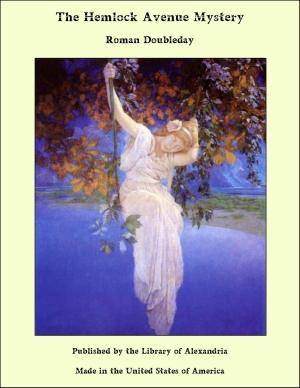| Author: | Edna Lyall (Ada Ellen Bayly) | ISBN: | 9781465625687 |
| Publisher: | Library of Alexandria | Publication: | March 8, 2015 |
| Imprint: | Language: | English |
| Author: | Edna Lyall (Ada Ellen Bayly) |
| ISBN: | 9781465625687 |
| Publisher: | Library of Alexandria |
| Publication: | March 8, 2015 |
| Imprint: | |
| Language: | English |
People who have been brought up in the country, or in small places where every neighbor is known by sight, are apt to think that life in a large town must lack many of the interests which they have learned to find in their more limited communities. In a somewhat bewildered way, they gaze at the shifting crowd of strange faces, and wonder whether it would be possible to feel completely at home where all the surroundings of life seem ever changing and unfamiliar. But those who have lived long in one quarter of London, or of any other large town, know that there are in reality almost as many links between the actors of the town life-drama as between those of the country life-drama. Silent recognitions pass between passengers who meet day after day in the same morning or evening train, on the way to or from work; the faces of omnibus conductors grow familiar; we learn to know perfectly well on what day of the week and at what hour the well-known organ-grinder will make his appearance, and in what street we shall meet the city clerk or the care-worn little daily governess on their way to office or school. It so happened that Brian Osmond, a young doctor who had not been very long settled in the Bloomsbury regions, had an engagement which took him every afternoon down Gower Street, and here many faces had grown familiar to him. He invariably met the same sallow-faced postman, the same nasal-voiced milkman, the same pompous-looking man with the bushy whiskers and the shiny black bag, on his way home from the city. But the only passenger in whom he took any interest was a certain bright-faced little girl whom he generally met just before the Montague Place crossing. He always called her his “little girl,” though she was by no means little in the ordinary acceptation of the word, being at least sixteen, and rather tall for her years. But there was a sort of freshness and naivete and youthfulness about her which made him use that adjective. She usually carried a pile of books in a strap, so he conjectured that she must be coming from school, and, ever since he had first seen her, she had worn the same rough blue serge dress, and the same quaint little fur hat. In other details, however, he could never tell in the least how he should find her. She seemed to have a mood for every day. Sometimes she would be in a great hurry and would almost run past him; sometimes she would saunter along in the most unconventional way, glancing from time to time at a book or a paper; sometimes her eager face would look absolutely bewitching in its brightness; sometimes scarcely less bewitching in a consuming anxiety which seemed unnatural in one so young. One rainy afternoon in November, Brian was as usual making his way down Gower Street, his umbrella held low to shelter him from the driving rain which seemed to come in all directions. The milkman’s shrill voice was still far in the distance, the man of letters was still at work upon knockers some way off, it was not yet time for his little girl to make her appearance, and he was not even thinking of her, when suddenly his umbrella was nearly knocked out of his hand by coming violently into collision with another umbrella. Brought thus to a sudden stand, he looked to see who it was who had charged him with such violence, and found himself face to face with his unknown friend. He had never been quite so close to her before. Her quaint face had always fascinated him, but on nearer view he thought it the loveliest face he had ever seen—it took his heart by storm.
People who have been brought up in the country, or in small places where every neighbor is known by sight, are apt to think that life in a large town must lack many of the interests which they have learned to find in their more limited communities. In a somewhat bewildered way, they gaze at the shifting crowd of strange faces, and wonder whether it would be possible to feel completely at home where all the surroundings of life seem ever changing and unfamiliar. But those who have lived long in one quarter of London, or of any other large town, know that there are in reality almost as many links between the actors of the town life-drama as between those of the country life-drama. Silent recognitions pass between passengers who meet day after day in the same morning or evening train, on the way to or from work; the faces of omnibus conductors grow familiar; we learn to know perfectly well on what day of the week and at what hour the well-known organ-grinder will make his appearance, and in what street we shall meet the city clerk or the care-worn little daily governess on their way to office or school. It so happened that Brian Osmond, a young doctor who had not been very long settled in the Bloomsbury regions, had an engagement which took him every afternoon down Gower Street, and here many faces had grown familiar to him. He invariably met the same sallow-faced postman, the same nasal-voiced milkman, the same pompous-looking man with the bushy whiskers and the shiny black bag, on his way home from the city. But the only passenger in whom he took any interest was a certain bright-faced little girl whom he generally met just before the Montague Place crossing. He always called her his “little girl,” though she was by no means little in the ordinary acceptation of the word, being at least sixteen, and rather tall for her years. But there was a sort of freshness and naivete and youthfulness about her which made him use that adjective. She usually carried a pile of books in a strap, so he conjectured that she must be coming from school, and, ever since he had first seen her, she had worn the same rough blue serge dress, and the same quaint little fur hat. In other details, however, he could never tell in the least how he should find her. She seemed to have a mood for every day. Sometimes she would be in a great hurry and would almost run past him; sometimes she would saunter along in the most unconventional way, glancing from time to time at a book or a paper; sometimes her eager face would look absolutely bewitching in its brightness; sometimes scarcely less bewitching in a consuming anxiety which seemed unnatural in one so young. One rainy afternoon in November, Brian was as usual making his way down Gower Street, his umbrella held low to shelter him from the driving rain which seemed to come in all directions. The milkman’s shrill voice was still far in the distance, the man of letters was still at work upon knockers some way off, it was not yet time for his little girl to make her appearance, and he was not even thinking of her, when suddenly his umbrella was nearly knocked out of his hand by coming violently into collision with another umbrella. Brought thus to a sudden stand, he looked to see who it was who had charged him with such violence, and found himself face to face with his unknown friend. He had never been quite so close to her before. Her quaint face had always fascinated him, but on nearer view he thought it the loveliest face he had ever seen—it took his heart by storm.















